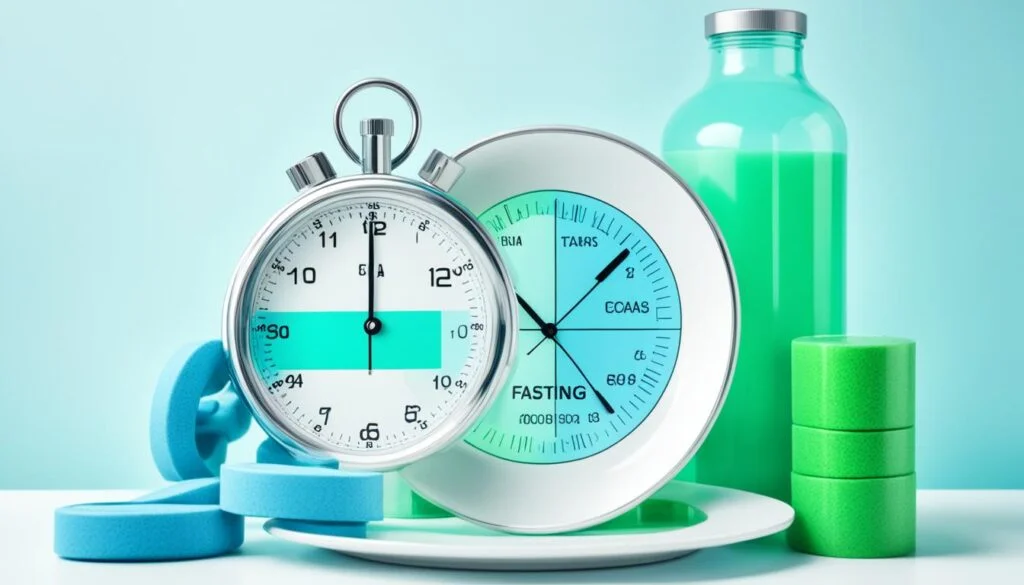Last updated on August 15th, 2025 at 05:49 am
Starting my intermittent fasting journey, I heard a lot about taking branched-chain amino acids (BCAAs) to keep muscles from shrinking. But, as a nutritionist, I wondered if BCAAs really fit with fasting principles. In this article, we will answer the million-dollar question: Do BCAAs break a fast?
Fasting changes our metabolism in big ways, like making us enter ketosis and reducing insulin levels. These changes help with weight loss, better blood sugar control, heart health, and less inflammation1. But, research suggests BCAAs might not be the best choice for these fasting benefits.

Leucine, a key amino acid in BCAAs, can mess with the mTOR pathway. This pathway is important for many fasting benefits. It helps with making new mitochondria, brain function, and fighting off diseases. Taking BCAAs during a fast can mess up these important processes.
Also, BCAAs can cause an insulin spike, which might stop the body’s self-cleaning process. This process, called autophagy, helps prevent diseases like cancer. Most fasting benefits come from being in a true fast, without supplements that mess with our body’s signals.2
► Table of Contents
Key Takeaways
- BCAAs might not be as good as thought during fasting, as they can mess with the metabolic changes that fasting brings.
- Leucine in BCAAs turns on the mTOR pathway, which can block AMPK, an enzyme key to fasting’s benefits.
- BCAAs during fasting can mess with important processes like making new mitochondria, brain function, and using fat for energy.
- The insulin spike from BCAAs can cancel out the benefits of cellular autophagy, a process that fights diseases.
- Most fasting benefits come from a true fast, without supplements that can mess with our body’s signals.
Understanding Fasting and Its Benefits
Intermittent fasting switches between eating and not eating or taking in few calories3. It focuses on when you eat, not what you eat. This method leads to changes like entering ketosis, using fat for energy, lowering insulin levels, and starting autophagy – cleaning out damaged cells4. Studies show it can help with weight loss, blood sugar control, heart health, reduce inflammation, and lower the risk of chronic diseases.
What is Intermittent Fasting?
Intermittent fasting is a way of eating that alternates between eating and fasting times. You might fast for 16 hours and eat during an 8-hour window, or fast for 24 hours a few times a week. The benefits come from the changes your body goes through when fasting.
Physiological Changes During Fasting
When fasting, your body starts using fat for fuel instead of carbs. This can make insulin work better, increase fat burning, and produce ketones, which are good for health. Fasting also starts autophagy, where the body gets rid of damaged cells, which can lower inflammation and disease risk.
“The benefits of intermittent fasting are related to the physiological changes that occur during the fasting state.”
Recommended Articles 👇
👉 The Hidden Vitamin and Mineral Gaps That Might Be Blocking Your Weight Loss
👉 You Have This Resistance; That’s Why You’re Not Losing Weight.
The Role of BCAAs During Fasting
BCAAs, especially leucine, are key for turning on the mTOR pathway. This pathway helps grow muscles and make proteins. But, it’s important to know how BCAAs, mTOR, and other processes work together during fasting.
BCAAs, Leucine, and mTOR Activation
BCAAs, especially leucine, can turn on mTOR. This can be good for building muscle but also has downsides during a fast. It can stop the AMPK pathway from working right, which is key for fasting’s benefits like better mitochondria, less inflammation, and better insulin use5.
Potential Consequences of Taking BCAAs While Fasting
Using BCAAs during a fast can stop AMPK from activating. It can also cause an insulin spike, which can mess with autophagy and metabolic flexibility. This might cancel out some of fasting’s health benefits.
Think about the good and bad of using BCAAs during a fast. It depends on your goals, fitness level, and fasting type6.
Choosing when to use BCAAs and other supplements with fasting needs thought and personal touch.
Do BCAAs Break A Fast?
Many people wonder if branched-chain amino acids (BCAAs) can end a fast. BCAAs are known for helping with muscle growth and recovery. But, their effect on fasting is more complex.
Amino Acids and Autophagy
Fasting starts a process called autophagy. Your body breaks down and recycles old or damaged cells. Any intake of amino acids, including BCAAs, will technically break a fast by interrupting this process of autophagy.
BCAAs and Insulin Response
Even a little protein or amino acids can cause a short insulin spike. This spike, from BCAAs, is short but can still affect the fasting process. For the best fasting benefits, it’s best to not take in any calories, including supplements.
Choosing to use BCAA supplements during a fast depends on your goals. You might want to consider body composition, fat loss, or muscle building7. Some might prefer stricter fasting to focus on metabolic and heart health benefits and avoid BCAA supplements7.

“Fasting may trigger increased human growth hormone (HGH) levels, and has shown positive effects on insulin sensitivity and blood sugar regulation.”
Always talk to your healthcare provider before starting any new diets, fasting, or supplements. They can help make sure they fit your needs and goals.
Preserving Muscle During Fasting
Many athletes and health enthusiasts worry about losing muscle during fasting. But, the body has ways to keep muscle mass even when we don’t eat.
Growth Hormone and Muscle Preservation
Fasting boosts growth hormone (GH) levels. This hormone is key for keeping lean muscle, as it helps muscles grow and repair. With high GH during a fast, the body stops muscle loss and keeps muscle building.
Ketones and Muscle Breakdown
When fasting puts the body into ketosis, ketones stop muscle breakdown. This helps the body keep muscle mass without needing extra amino acids like BCAAs.
These natural processes help keep muscle mass during fasting, without needing extra supplements.

“Fasting leads to a significant increase in growth hormone, which can help preserve lean muscle mass even in the absence of caloric intake.”
Conclusion
BCAAs are often seen as key for keeping muscle during fasting. But, research suggests they might actually harm the fasting benefits. They can stop the body’s natural muscle-saving processes by turning on mTOR and causing insulin spikes. For those wanting to get the most from fasting, skipping BCAAs and other supplements during the fast is best.
The body can naturally keep muscle mass safe during fasting. This is thanks to natural processes like increased growth hormone and ketone production. These changes are more important for health than worrying about losing muscle.
Amino acids are crucial for muscle growth and repair. But, taking them during a fast can mess with the body’s self-cleaning process. Eating foods rich in amino acids like bone broth and eggs helps keep muscles strong without losing fasting benefits. Adding glutamine and tyrosine can also help control insulin levels and keep the mind sharp during fasting.
Deciding to use BCAAs or other supplements with fasting should be talked over with a doctor. It’s important to find a balance that keeps you healthy and helps you get the most from fasting. Knowing how BCAAs, insulin, and fasting work together helps you make choices that fit your fitness and health goals.
FAQs
Q: Do BCAAs break a fast?
A: Yes, BCAAs can break a fast. They stop the body’s natural cleaning process called autophagy. This process is key to fasting’s benefits. BCAAs, especially leucine, can start the mTOR pathway and make insulin levels rise. This goes against the autophagy process.
Q: How do BCAAs affect the benefits of fasting?
A: BCAAs can mess with fasting’s benefits like making new mitochondria, reducing inflammation, and improving insulin use. They can also stop autophagy and mess with your body’s metabolic flexibility.
Q: Can I take BCAAs while fasting to prevent muscle loss?
A: Some athletes fear losing muscle during a fast. But, the body has ways to protect muscle, like more growth hormone and ketones. You don’t need extra amino acids like BCAAs. Sticking to a true fast is best for getting the most out of autophagy and AMPK activation.
Related Articles
- Do Electrolytes Break a Fast? All Things You Need To Know
- 72 VS 96 Hour Fast: Is It Safe For You?
- 48 vs 72 Hour Fast: Which Is Better For You?
- 15 Best Intermittent Fasting Books
- Does Creatine Break a Fast?
- Does Pre Workout Break a Fast?
- Does Celsius Break a Fast? Exploring the Impact on Intermittent Fasting
- Do Pre Workouts Have Calories?
- circadian rhythm fasting
- The Stages of Fasting: What to Expect
- Dirty Fasting
- Fasting Mimicking Diet (FMD Diet): What Is It? Does It Work?
- Fasting for 48 hours: How-To, Benefits, and Downsides
- 7 Best Protein Shake for Intermittent Fasting: A Comprehensive Guide
- Does a Protein Shake Break a Fast? Debunking Myths and Understanding the Science
- 45 Best Electrolyte Powder for Fasting
- 13 Best Apple Cider Vinegar for Fasting
- Unveiling the 5 Best MCT Oil for Intermittent Fasting: A Comprehensive Review
- Does Chamomile Tea Break A Fast? The Shocking Truth
- 8 Best Tea for Fasting: A Comprehensive Guide for Tea Lovers
- Semaglutide and Intermittent Fasting: A Comprehensive Guide to Weight Loss and Metabolic Health
- The Ultimate Guide to Mastering Intermittent Fasting and Carb Cycling
- The Ultimate Guide to 15/9 Intermittent Fasting for a Healthier You
- Can I drink tea with artificial sweetener during intermittent fasting?
- Does Apple Cider Vinegar Break a Fast? The Ultimate Guide for Health Enthusiasts and Intermittent Fasters
- Does MCT Oil Break a Fast? The Quarter Pounder of Fasting Fuel
- Intermittent Fasting: The Ultimate Guide
- Can You Chew Gum While Fasting: The Sticky Truth
- 16 Best Coffee Creamer for Intermittent Fasting
- Does C4 Pre Workout Break Intermittent Fasting? The Shocking truth
- 5 Best Pre Workout for Intermittent Fasting: The Ultimate Guide
- Intermittent Fasting for Women Over 50: A Definitive Guide
- Fat Fasting: Is It for Fat Only?
- Eat stop Eat: The Secret of Brad Pilon
- 22/2 Intermittent Fasting: Are You Strong Enough For This?
- 20/4 Intermittent Fasting: Don’t Try this Unless…
- 18/6 Intermittent Fasting: The Secret Of Keto Practitioners
- 16 Potential Intermittent Fasting Side Effects And Their Solution
- 14/10 Intermittent Fasting: Why Is It Not For You?
- Dry Fasting: How Does It Make You Lose Weight
- THE MOST IMPORTANT BENEFIT OF AUTOPHAGY WILL SURPRISE YOU
- Surprising 20+ Benefits Of Eating One Meal A Day
- Acceptable Liquids During Intermittent Fasting: No. 7 Is Surprising
- IN INTERMITTENT FASTING CAN I EAT FRUITS?
- OMAD – One Meal A Day Diet: The Unspoken Truth
- Alternate-Day Fasting: Is It A Waste Of Time?
- 5:2 Diet: What is it And Does It Work?
- 16/8 Intermittent Fasting : Everything You Need To Know
- Food Fasting : All Things You Need To Know
Ali Webster is a seasoned researcher, communicator, and Registered Dietitian with a diverse background encompassing government, nonprofits, academia, and health care. The core belief is that science should be made accessible, understandable, and relevant to all individuals, driving the motivation behind their work. Proficient in conducting and interpreting research to shape nutrition policy decisions, the individual also excels in nutrition and health communication, consumer research survey development and implementation, and clinical nutrition. Holding a Doctorate of Philosophy with a focus on Nutrition and Epidemiology from the University of Minnesota, their dietetic internship emphasized medical nutrition therapy.
